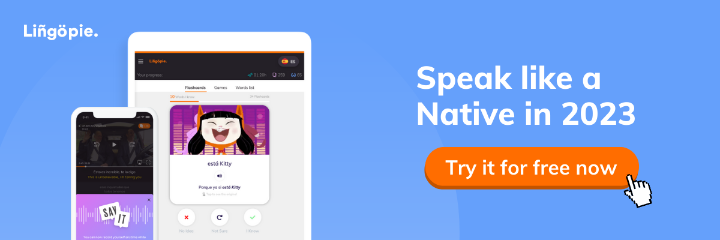Embarking on the journey to become a polyglot, fluent in multiple languages, is a pursuit as enriching as it is challenging.
While traditional language learning methods have their place, there exists an unconventional and enjoyable path to mastering multiple languages: watching movies with subtitles.
This guide explores how this seemingly leisurely activity can be transformed into a potent language acquisition tool.
Imagine unlocking the linguistic mysteries of the world's diverse cultures from the comfort of your own home, all while indulging in captivating cinematic narratives.
Through the strategic use of subtitles, you can hone your language skills, develop a deeper understanding of your target languages, and break down the barriers that separate you from the millions of people who speak your target language.
In this post, we will delve into the intricacies of this unique language-learning approach, unveiling effective strategies, benefits, and practical tips to help you embark on your polyglot journey with the magic of movies and subtitles as your companions.

Table of Contents:
- Mastering Multiple Languages By Watching Movies
- How to Start
- Subtitles are the Key
- Consistency is Important
- Embracing a Polyglot Lifestyle
- FAQs
- Summing Up: How to Become a Polyglot by Watching Movies with Subtitles
Mastering Multiple Languages By Watching Movies

Becoming a polyglot involves immersing yourself in the captivating world of multiple languages.
This linguistic journey transcends borders, connecting you with people from diverse backgrounds and cultures. While the idea of mastering multiple languages may appear daunting, it's an achievable endeavor with thoughtful planning and dedicated practice.
Learning multiple languages empowers you to bridge communication gaps and gain profound insights into different cultures.
By watching movies in your target languages with subtitles, you can transform this process into an enjoyable and effective learning experience.
Whether you're starting with one language or aspiring to conquer several, this approach, coupled with strategic language learning techniques, will enable you to set and attain your language proficiency objectives.
How to Start?
Starting the journey of learning a new language can be both exciting and rewarding. Here's a step-by-step guide to help you get started:
- Choose One Language: Begin by selecting one language you're passionate about learning. Focusing on one language at a time will help you make steady progress. As soon as you start mastering it add another.
- Immerse Yourself: Language Immersion is key. Start by watching movies, listening to music, and exploring content in your chosen language. Kids' shows are an excellent choice for beginners due to their simplicity and clear pronunciation.
- Build Confidence: As you immerse yourself, you'll gradually build confidence in your language skills. Don't rush the process; it takes time to become proficient.
- Consider Another Language: Once you feel comfortable with your first language, you can explore learning another. However, it's advisable not to learn two similar languages simultaneously (e.g., Spanish and Italian) as it can be confusing.
- Use Movies: Movies are a powerful tool for language learning. They expose you to authentic dialogues, diverse accents, and cultural nuances. Visual and auditory context in films make language acquisition more intuitive and enjoyable.
Learning a language through movies is not only effective but also incredibly enjoyable.
So, pick a language, start immersing yourself, and embark on a linguistic adventure that will open up a world of new cultures and opportunities.
Then, as soon as you feel confident enough add another, and then another. You can learn multiple languages this way if you are consistent.
Subtitles are the Key

When it comes to learning languages through movies, subtitles are the golden ticket. They serve as the bridge that connects you to the world of several languages, making the process not only enjoyable but incredibly effective. Subtitles, in this context, act as a powerful tool that can help you become a polyglot.
One valuable resource that embraces this concept is Lingopie. Lingopie is an innovative platform that offers a wide array of movies and TV shows in their original language with dual subtitles.
This unique feature allows you to watch content in a particular language while simultaneously viewing subtitles in both that language and your native tongue.
By utilizing Lingopie, you can seamlessly transition into a new language. The platform caters to those looking to delve into a new language, explore other languages beyond their native one, or even help language learners enhance their proficiency.
It's an invaluable resource for aspiring polyglots as it facilitates the process of learning through movies. Subtitles, in conjunction with Lingopie, open the doors to a world of linguistic possibilities, enabling you to embrace the beauty of several languages and become a true polyglot.
Consistency is Important
When it comes to mastering different languages through foreign films, consistency is your steadfast ally.
It's not enough to sporadically watch foreign movies; it needs to be an integral part of your daily routine. Like a dedicated language teacher, daily exposure to foreign languages and films is the path to progress.
By making foreign language movies your daily habit, you immerse yourself in a new linguistic world. This consistent engagement allows you to transition seamlessly from one foreign language to the next.
Whether you're tackling several languages simultaneously or deepening your proficiency in a local language, your daily rendezvous with foreign films turns each day into a lesson and transforms your second language skills.
So, remember, in the journey of becoming a polyglot, consistency is your trusted guide to success.
Related:

Embracing a Polyglot Lifestyle
Mastering multiple languages, including those with complex grammar and related languages within the same family, is a journey worth undertaking.
When you're ready to add your next language to the repertoire, starting slow can be both effective and enjoyable. Consider immersing yourself in the world of kids' shows and movies in your target language.
These delightful and straightforward content options serve as a gentle introduction, allowing you to gradually adapt to the nuances of your next language without overwhelming yourself.
You'll find that as you delve into this new linguistic realm, you'll gain confidence and competence, ultimately adding another layer to your polyglot lifestyle.
So, whether you're eager to speak Spanish or explore related languages, remember that the path to linguistic mastery begins with small steps, often in the most unexpected places, like kids' shows.
FAQs: How to become a polyglot
In this section, we provide answers to frequently asked questions about mastering multiple languages.
Discover effective strategies and practical tips for your journey to becoming a polyglot through the captivating world of cinema.
What are the best language learning strategies if you are learning multiple languages?
The best language learning strategies for mastering multiple languages include setting realistic goals, dedicating time to daily practice, using language learning apps, immersing yourself in native content like movies with subtitles, and seeking opportunities to converse with native speakers.
How long does it take to become a polyglot?
The time it takes to become a polyglot varies depending on individual factors, such as prior language knowledge, dedication, and the complexity of the languages. Generally, it can take several years to achieve a high level of proficiency in multiple languages.
How many languages do you need to be a polyglot?
There is no specific number of languages required to be considered a polyglot. Some define it as knowing and using several languages, while others consider it as knowing a significant number of languages, often four or more.
Can anyone become a polyglot no matter their native language?
Yes, anyone can become a polyglot, regardless of their native language. The key is determination, practice, and effective language learning strategies. It's about the effort and dedication you invest in learning and using multiple languages.
What is the easiest language to become a polyglot?
The easiest language to become a polyglot largely depends on your native language and personal preferences. However, languages with simpler grammar structures, such as Esperanto or Spanish for Romance language speakers, may be considered relatively easier to learn and incorporate into a polyglot repertoire.
Summing Up: How to Become a Polyglot by Watching Movies with Subtitles
In the quest to become a polyglot, the art of learning languages through movies with subtitles proves to be a dynamic and effective strategy.
This unconventional approach not only enriches your linguistic repertoire but also offers a window into diverse cultures.
By employing strategic language learning strategies, you can embark on the remarkable journey of mastering more than one language.
The significance of subtitles lies in their power to enhance comprehension, pronunciation, and context, making the learning process engaging and immersive. It transforms movies into invaluable language resources, bridging the gap between cinema and education.
As you traverse this path, you'll discover that watching movies with subtitles transcends mere entertainment; it becomes a language-learning adventure.
By weaving this practice into your daily routine, you'll unlock the potential to become a polyglot, skillfully navigating the boundaries of different languages and connecting with people worldwide.
So, let subtitles be your guide on this transformative language-learning odyssey and soon enough you will have polyglot status as well.





![Learn Spanish With YouTube [12 Effective Techniques]](/blog/content/images/2023/10/59FCD7D6-A308-4D6A-B582-0448196F5796.png)
![11 Best Italian Cartoons for Italian Learners [The Ultimate Guide]](/blog/content/images/size/w1200/2023/10/Spanish-1-1.png)
![5 Official Spanish Language Tests To Show Your Proficiency Level [Guide]](/blog/content/images/size/w300/2025/06/Spanish-Language-Tests.jpg)
![Why Memorizing Spanish Words Won’t Make You Fluent [Tips]](/blog/content/images/size/w300/2025/06/how-to-practice-spanish-vocabulary.jpg)
![How to Improve Your Polish Conversation Skills [5 Best Tips]](/blog/content/images/size/w300/2025/06/improve-polish-conversation-skills.jpg)
